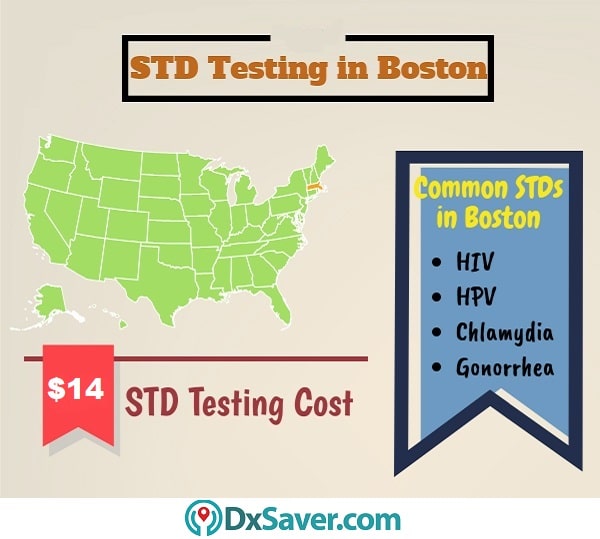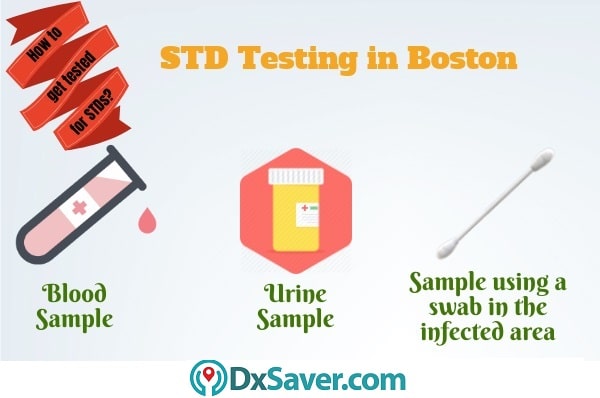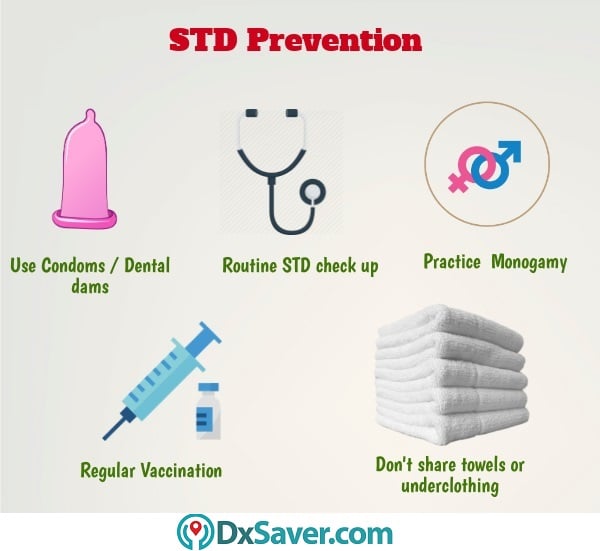
STDs refer to sexually transmitted diseases caused by microorganisms such as bacteria, viruses, yeast, and parasites. They can lead to severe complications such as infertility if left untreated at an earlier stage of infection. Also, most STDs do not show any symptoms in their earlier stages. So we highly recommend every sexually active person get tested for STD screening at least once a year.
The article below covers all the significant topics that are related to sexually transmitted diseases in Boston, MA like STD testing cost, oral STDs, common STDs found in Boston, how to check for STDs, preparation, treatment, complications, and where to get tested for STDs.
- STD Testing Cost in Boston
- What are STDs?
- How are STDs Transmitted?
- Oral STD
- What are the most common STDs found in Boston?
- What are the signs and symptoms of STDs?
- How to check for STDs?
- Is there any preparation required before the STD testing?
- Where to get tested for STDs?
- STD treatment
- Is STD curable?
- What are the methods to prevent STDs?
For our readers, who are very much interested in knowing the STD testing cost in Boston, MA we would like to begin with that section.
How much does STD testing cost in Boston, MA?
STD testing cost ranges between $14 and $444 in different labs and facilities across Boston. The STD testing cost also depends on the choice of your specific STD testing or testing for all the STDs (STD panel). No prior appointment is required. Compare the price, order your test online and visit the nearest lab during lab business hours or shop the STD home testing kit. Complete the procedure and get the results in your email in 2 to 3 business days.
The following table shows the STD home test kit and STD testing cost in Boston at 3 of our partner laboratories (CLIA – Certified) networks located across the U.S.
Name of our Partner Labs | Book Online |
STD Check Labs
| Starting from
|
LetsGetChecked(Home Test Kit)
| Starting from
|
HealthLabs
| Starting from$24 |
STD testing
STDs require two stages of testing. If you experience the symptoms or suspect the possibility of being exposed to the infection, a screening test will be done initially to check the presence of microorganisms in the body that cause STD. These test results have a positive or negative outcome. If the screening test results are positive, further diagnostic tests will be performed to find out the exact stage of infection.
STD testing cost in Boston with insurance
Many health insurance companies in Boston do not cover the cost of STD screening tests. But they might cover the cost of the additional diagnostic tests performed. However, the coverage offered by private insurance companies and national health insurance programs like Medicare and Medicaid varies widely. So we recommend you to check the coverage of your health insurance plan before getting tested for STDs.
Our STD testing providers in Boston, MA offer screening tests for all the STDs and do not accept any kind of health insurance plan. But, if the insurance company accepts to reimburse your cost, they can provide you with an itemized receipt containing all the details like the name and code of the test, and the CPT code that is necessary for insurance reimbursement purposes.
What are STDs and how are they transmitted?
Sexually Transmitted Diseases are referred to as STDs in short and sometimes known as Venereal Diseases. STDs are infections spread through sexual contact caused by microorganisms such as bacteria, viruses, yeast, and parasites. These microorganisms grow in the genital areas as they are usually moist and warm.
STDs are transmitted through vaginal, anal, or oral sex with the infected person and sometimes through blood or skin contact. Hardly, there are chances of getting an STI (Sexually Transmitted Infection) when you come into close contact with the wet object like towels, wet clothing, or toilet seats of the affected person. A pregnant woman can pass the disease easily to her child at birth.
Does oral sex lead to oral STD?
Oral sex is stimulating the genitals using the mouth or tongue. The microorganisms that cause STDs can enter the body through cuts in the mouth, anus, and genitals. So, yes, oral sex can lead to an oral std. The most common oral STDs found in the U.S. are Gonorrhea, Syphilis, and Oral Herpes. This type of infection generally affects the mouth and throat of men and women. The common symptoms of oral STDs are fever blisters, sore, and painful throat.
STD causes, symptoms, risks, and treatment explained in a short 2 minutes video:
What are the most common STDs found in Boston, MA?
There are more than 20 types of common sexually transmitted diseases such as Chlamydia, Gonorrhea, Syphilis, Herpes, Hepatitis, HIV, Trichomoniasis, and HPV that affect both men and women. The most common STDs found in Boston are
1. HIV
HIV (Human Immunodeficiency Virus) is a virus that causes a syndrome called AIDS (Acquired Immuno Deficiency Syndrome). AIDS is the most advanced stage of HIV. HIV occurs in three stages namely the acute stage, chronic stage, and AIDS. HIV affects the most important parts of the body and T cells of our immune system. It can spread sexually, prenatally, or through blood but cannot spread through air or water. The common symptoms of HIV infection are
- Fever
- Chillness
- Sore throat
- Pain in the joints
- Unexpected weight loss
- Night sweat
- Tiredness and weakness
- Diarrhea
- Dry cough
- White spots on the tongue or mouth
HIV is fatal and cannot be cured. But when you diagnose it at an early stage and treat it with anti-retroviral drugs, HIV can be managed. If HIV is left untreated, it will weaken your immune system to fight against the infection. Check out the HIV RNA Early Detection Test in the US.
2. HPV
Human papillomavirus (HPV) is a viral infection transmitted through skin contact. Most of the HPV varieties are spread through sexual contact and affect the genitals, mouth, and throat. HPV can also cause cervical cancer and other cancers in the genitals and throat. Mostly, HPV can go away on its own without showing any signs or symptoms. But when it doesn’t, it may lead to serious health problems.
HPV can be detected using a PAP Smear test. Physicians recommend every woman above the age of 30 to screen for HPV infection at least once a year regardless of sexual activity.
3. Chlamydia
Chlamydia is one of the most common sexually transmitted diseases and it is caused by a bacterium called Chlamydia trachomatis. It can be cured only when it is diagnosed and treated at the earliest. Some people may get this infection in their eyes which is called Eye Chlamydia. This occurs when you touch your eyes without washing your hands after sex. Chlamydia-infected people do not notice any symptoms for several weeks but Chlamydia at the advanced stage can damage the reproductive system resulting in pelvic inflammatory disease and infertility in both men and women. Some of the common symptoms of Chlamydia infection are
- Unusual genital discharges
- Urge to urinate
- Pain while urinating
- Excess vaginal bleeding in women
4. Gonorrhea
Gonorrhea, also known as “The Clap” is caused by the bacterium Neisseria gonorrhoeae. It can be experienced with Chlamydia simultaneously. Gonorrhea doesn’t show any symptoms in some people but if it is left untreated it may result in some serious complications. You can get gonorrhea infection even in the throat. This infection can also be transmitted through oral sex. Some of the common symptoms of Gonorrhea experienced by both men and women are
- Swelling and pain in the joints
- Fever
- Painful urination
- Swollen neck lymph nodes
- Unusual genital discharges
- Testicular pain
- Painful sexual intercourse
Gonorrhea can be easily treated with the help of antibiotics. If it is not diagnosed and treated at an earlier stage, it may result in infertility in both men and women.
What are the signs and symptoms of STDs?
Most people with an STI do not show or experience any symptoms at the earlier stage of infection. So we recommend every sexually active young person to consult a physician if you suspect of having an STD or feeling the possibility of being exposed to it. Some of the common STD symptoms in men and women are
Symptoms in women
- Abnormal vaginal discharge
- Pain during urination
- Painful sexual intercourse
- Pain in the back or lower abdomen or pelvis
- Heavy menstrual bleeding
Symptoms in men
- Dark penile discharge
- Burning sensation while urinating
- Swelling and pain in the testicles
- Anal itching
- Penile irritation
- Painful and irregular bowel movements
Common symptoms
- Unexplained weight loss
- Fever
- Headache
- Joint pain
- Jaundice
- Diarrhea
- Cough
- Unusual sweat during the night
- Fatigue
- Soreness in throat
How to get tested for STDs?
There are different tests available to diagnose STDs. To get tested, your concerned physician may ask you to take a specific test depending on the medical and sexual history you have and the symptoms you experience. You may be asked to take a blood sample or a urine sample or a sample taken using a cotton swab in the infected area such as mouth, throat, vagina, anus, or penis.
When to get tested for STDs?
For more accurate results, physicians recommend waiting for at least a week after the initial exposure but it also depends on the type of infection. Because some STDs like Chlamydia and Gonorrhea can be tested after a week of infection whereas HIV requires a minimum period of 2 months to get tested. This window period is to ensure an accurate diagnosis.

Is there any preparation required before the STD testing?
There is no special preparation required before testing for STDs that require a blood sample. Only STDs such as Chlamydia and Gonorrhea will be tested using a urine sample. For taking the urine sample, it is compulsory not to urinate for at least an hour before taking the sample. But there is no constraint on the diet.
Where to get tested for STDs?
You can get tested for STDs anywhere in Boston near you. You can book your test online, visit the lab near you anytime during the lab working hours without any prior appointment. After you have taken the test, the test results will be confidentially emailed to you within 2 to 3 business days.
You can also get tested for STDs at your home using the STD home test kit, if you do not have time to visit the lab or if you are not comfortable in taking the STD test at a commonplace i.e. STD clinic.
You can order your STD home test kit online, take the required sample by carefully reading the instructions mentioned in the kit, and post the sample back to the given address. The test results will be emailed to you within 3 to 5 working days. However, the turnaround of results depends on the receipt of the sample in the lab.
STD Treatment
STDs can be treated using antibiotics and antiviral drugs at their earlier stages of infection. Penicillin injection is used to treat syphilis infection. It is very important to consume all the antibiotics prescribed by the physician even after all the symptoms go away. In the case of incurable STDs, anti-retroviral drugs are used to control and manage the symptoms.
Is STD curable?
No, all STDs cannot be cured. Bacteria causing STDs like Chlamydia, Gonorrhea, and Syphilis can be cured at their earlier stages of infection. Viral infections like HIV, Herpes, and Hepatitis cannot be cured completely but can be controlled and managed.
What are the methods to prevent STDs?
- Regular vaccinations and routine STD checks
- Practicing monogamy – not having sex with anyone other than your husband/wife
- Not sharing any towels and underclothing
To prevent reinfection, we recommend you do a follow-up check after 1 month of your past treatment and never practice sex until you get cured completely.
If you are looking for STD Test in any other part of the country, check here STD Testing Cost in the U.S.

Frequently Asked Questions
Will insurance cover my testing cost?
No, insurance will not be covered in the billing. However, they will provide you a receipt for insurance reimbursement purposes.
How should I book my appointment?
You can choose the most suitable provider from above and make an appointment by following the instructions mentioned by them.
Can I cancel my lab test order?
Yes, you can cancel your lab test order anytime before your testing. A refund will be initiated after deducting the cancellation fee. However, cancellation is at the discretion of the provider.
Do the providers offer result interpretations?
Yes, a few providers may provide doctor consultation who will take you through the results and provide clarification if needed.
How do I receive my report?
To ensure your privacy, the test report will be mailed to you by the provider.
Other topics you may be interested in:-
- STD Testing Cost in San Diego
- STD Testing Cost in New York
- Planned Parenthood STD Testing Cost
- Types of STDs that Cause Blood in Urine
- What Types of STDs cause Dry Skin?
- Cost of Alpha-Fetoprotein, AFP Test in the U.S.
- Thyroid Peroxidase, Anti-TPO Test Cost in the U.S.
- Causes of Bruising on Skin & Other STD Symptoms
- Causes of Penile Rashes and Other STD Symptoms in Men
- Types of STDs That Cause Mouth Sores Symptoms in Men and Women





